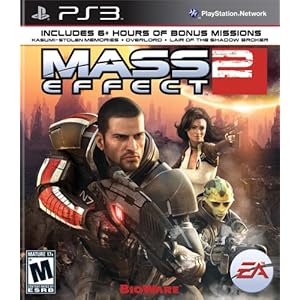A lot of people will tell you 2012 was a disappointing year for boxed games, and I’d agree with them on a few counts, at least compared to the last couple years. On the other hand, it was a great year for alternative, downloadable games, and there were plenty of new experiences to make the increasingly long wait for new consoles easy to forget.
Best of 2012
9. Mark of the Ninja (Multi)

Mark of the Ninja was one of several games this year to rely on stealth for the meat and potatoes of its gameplay, and while it wasn’t my favorite, it was certainly interesting in its approach. Most stealth games tend to anger their players at some point or another when they get caught and don’t know why, but that’s never a problem with Ninja, where thanks to clever interface and game design, it’s perfectly clear at any moment why you can or cannot be detected by enemies. Add in the beautiful 2D art and animation, extremely fluid controls, and useful variety of weapons and gadgets, and there’s a lot to like here.
8. Journey (PS3)

I wasn’t as in love with Journey as some other people, as I kind of felt like we already got some of what ThatGameCompany was going for with their previous game, Flower. Even if you aren’t grabbed by the game’s simple play of jumping around and sliding down hills and wordless, vague story though, it might be worth discovering on just a technical level. The graphics are gorgeous – I don’t think anyone’s ever made a desert look this attractive before. And the unique multiplayer creates an experience that’s possibly worth the purchase price by itself. It’s amazing how easy it is to prevent people on the Internet from being jerks just by taking away their ability to talk. It’s a game that for some is a transcendent pleasure, and for others a boring experiment that doesn’t work. I found myself closer to the former on the spectrum.
7. Sleeping Dogs (Multi)
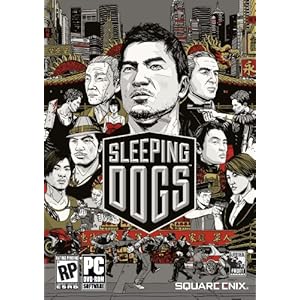
I never played a game in the True Crime series, so I was uninterested when they announced a new one set in Hong Kong, even after it stopped being a True Crime game and got the title Sleeping Dogs. I kept hearing about it after it came out though, and finally gave it a shot, which turned out to be worth it. Sleeping Dogs is the best modern open world crime game since Grand Theft Auto IV, and you can make a strong case that’s it’s actually better. Like plenty of games since the GTA series became popular, it offers a few innovations on the formula that will only make the genre more accessible, but it’s also worth checking out just for the game itself, which is just the right length and level of maturity. Inspired by Hong Kong action movies, it tells a totally competent undercover cop story with some great voice acting, has a variety of things you can do to pass time, and most important, the core missions are actually a lot of fun, with decent car and foot chases, acceptable gunplay, and best of all, a robust melee combat system that takes obvious inspiration from both kung fu cinema and the great hand-to-hand battles in Batman: Arkham Asylum and its sequel. It has its shortcomings, but I’d recommend it to anyone who needed a fix while waiting for the next GTA.
6. Darksiders II (Multi)
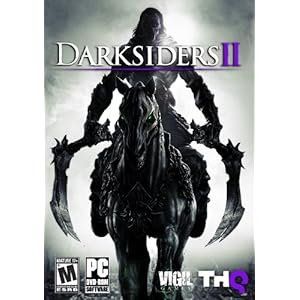
I know a lot of people were really disappointed with Darksiders II. And I don’t really get it. It combines fast-paced, stylish character action in the vein of Devil May Cry with puzzle-focused dungeon exploration in the vein of The Legend of Zelda just like the original Darksiders, and also adds fluid traversal/platforming in the vein of Prince of Persia. I realize that that’s a lot of “in the vein”, but that’s what the series is. Where the game definitely falters is in the addition of an RPG-style randomized loot system, which makes some sense when you think about the lure of always finding better gear to keep up with the increasingly tough enemies, but which takes away the definite thrill of discovering things in this kind of game. It’s certainly odd to go through the trouble of solving a uniquely designed, one-time puzzle and get rewarded with a randomly generated item that may or may not be better than what you already have. It’s also sort of dull from a story perspective, sticking to mundane fantasy worlds where Darksiders mixed that up with a destroyed modern earth in interesting ways, and not being allowed to advance the plot by virtue of taking place at the same time as the first game. Still, it’s full of well-made dungeons and is just a lot of fun to play, so I have a hard time taking much issue with it. Not what it could have been, but still good.
5. Far Cry 3 (Multi)
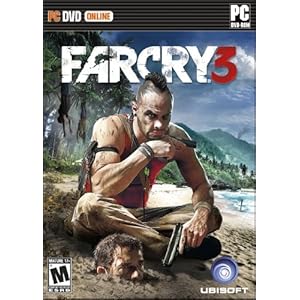
Far Cry 2 was a brilliant game, but a lot of people didn’t see it that way, and I don’t blame Ubisoft for a lot of decisions they made with the sequel. In fact, I think some of them were for the better. Far Cry 3 combines the setting and basic premise of the first game (regular guy trapped on a tropical island) with the basic gameplay and structure of the second (you wander around an open environment in first person, fending off attackers from all sides), and adds a bunch of systems and poorly-thought through plot elements. You can now take over outposts to prevent enemies from ever appearing in the same area again, and you can gain experience points to unlock new abilities, and you can hunt and skin animals to craft items that let you hold more supplies and boost your stats. It makes it overall a friendlier world to be in, which is good for accessibility, but undeniably damages the unique feeling of lonely desperation you got out of the last game. Still, it’s a blast to screw around, whether you’re burning a patch of jungle to the ground, silently knifing every thug in the immediate area, or getting into a hectic car chase that will end in a painful explosion and lots of gunfire. Just make sure to turn off some of the more intrusive interface elements and ignore the poor attempts at story and character.
4. Hotline Miami (PC)

Hotline Miami. It’s sort of like if you made an entire game out of those brief scenes in Drive where Ryan Gosling killed goons with his bare hands. It’s an extremely fast action game. But it’s also a stealth game. And a puzzle game. Your goal on each level is to kill everyone you see before they can kill you. You can knock them over by bashing through a door they’re standing behind. You can shoot them or smash them with guns or various objects you find. If they’re lying on the ground but not dead yet, you can smash their heads into the floor, or snap their necks, or worse. Playing it can feel like a bad trip – the faux-80s dance soundtrack (there’s the Drive influence again) is always pounding, and the graphics are ugly pixelated garbage, and lights are flashing and the ground is kind of moving in a disorienting way. The story is nonsense, and it tricks you into thinking maybe there’s something deeper under all this violence, before it pulls out the rug and you finally learn it really is all about the violence. You will die hundreds of times, and you won’t care because you can start a level again instantly and it’s just so fun to play. Hotline Miami is unique and unforgettable.
3. Mass Effect 3 (Multi)
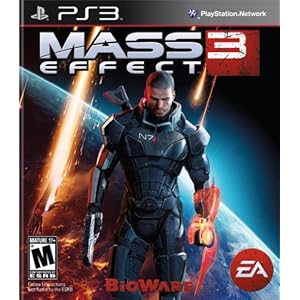
Mass Effect 3 caught a lot of heat for its (honestly underwhelming) ending, but everything before that lives up to the challenge of bringing an exceptional science fiction saga to a conclusion. It lacks the thrill of discovering a whole new galaxy from Mass Effect, and doesn’t have the huge, diverse core cast of Mass Effect 2. It does give you the sense of a whole galaxy struggling to survive, and brings back a lot of the series’ larger conflicts and resolves them in satisfying and often deeply affecting ways. It’s also the most fun the series has been to play, as long as you don’t mind doing a whole lot of shooting from behind cover. I wish the conclusion cared a little more about how I spent the previous 80 hours it took to get to that point in the series, but it’s still a game worth playing, and has payoffs a fan of the series would want to see.
2. Dishonored (Multi)
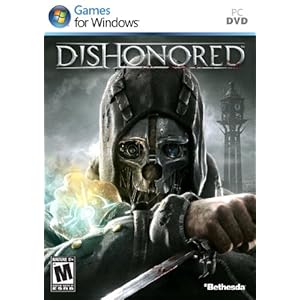
Dishonored deserves praise just for the fact that it exists. A big budget action stealth game with magic powers, a somewhat cartoony graphic style, and a setting that is hard to sum up more succinctly than “whale oil-punk”? I still wonder how it got made. But to only praise it for the miracle of its existence is to ignore that it’s actually a really good game. You are tasked with exacting vengeance on the people who have had you falsely accused of treason and thrown in prison (from which you promptly escape), and your options in doing so are vast and always interesting to discover. You have a variety of powers and equipment at your disposal, and it’s up to you whether you try to sneak by enemies without being seen or run around killing them like a madman. Your options are a bit limited if you want to avoid murder, and the story isn’t too interesting, and they don’t really make much use of the extremely famous voice cast. These are minor issues though when you take in the sheer depth and inventiveness of the game’s exception world design and the way it all fits together.
1. The Walking Dead (Multi)

The Walking Dead deserves so many superlatives, it’s hard to know where to start. To begin, it’s easily the best thing to come out of the increasingly popular zombie franchise. It’s also one of the best adventure games in years, and has one of the best stories in a video game ever. I know hitting emotional notes isn’t the only thing a story can do, but it’s one of the places where games in particular have had the biggest trouble, and the fact that I can honestly say this game made me cry by the end definitely speaks volumes about how well they end up developing the characters and their relationships. The story doesn’t branch as much as you might expect based on what the developers said about it, and if you aren’t into basically just clicking on things and listening to people talk, it might not be for you. But it’s certainly one of the best zombie stories ever told.
Delayed Entry
This is the best game that wasn't released in 2012 but I didn't play until then.
Saints Row: The Third (Multi)
Saints Row always seemed like another probably-mediocre clone of the Grand Theft Auto series but the third game in the series reaches almost genius levels of brilliance throughout. When you strip out all of the presentation elements, it’s an open world crime game, where almost every mission comes down to you driving somewhere and then shooting enemies from a third person perspective. Of course, stripping out the presentation elements robs you of what really makes the game work and be such an entertaining experience from start to finish. The writing, despite telling a very silly story, is remarkably intelligent, and it is handled by a voice cast that does a great job of keeping things always changing and always funny. Grand Theft Auto is always straddling the line between serious and satire, and it’s nice to have a game that is just a straight up comedy instead. Nice visual direction and a great use of licensed music also add to the sense of fun throughout. It’s not the most solid game ever created, but it’s easily good enough to be sustained by the other things that make this such a memorable way to blow a dozen hours or two.
Monday, January 14, 2013
Best Games of 2012
Friday, April 8, 2011
Game Update 17: DLC Round-Up 4
Surprised it's been over a year since I've done this. But I guess that happens when you don't buy any new games for almost a year.
Assassin's Creed: Brotherhood: The Da Vinci Disappearance
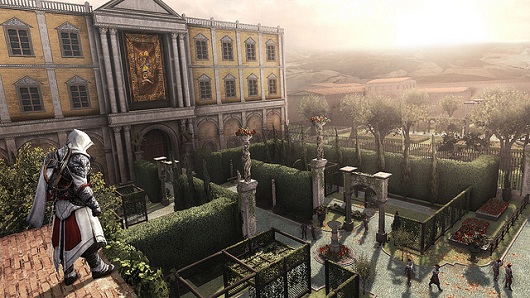
Review at Player Affinity
Costume Quest: Grubbins on Ice

This add-on to Costume Quest was roughly one third the length of the original game at one third of the price, which made it a nice way to extend the experience a little for fans. It takes place after the original and has a winter theme, though the gameplay is pretty much the same - you trick or treat until the area is clear, fight simple turn-based battles, find some collectible costumes and upgrades, and find stuff for people. The boss fight at the end was the most challenging encounter they've made so far, although it still wasn't terribly difficult. The ending teases more content on the way, though I suspect at this point it will be another stand-alone game rather than a small five dollar chunk.
Left 4 Dead 2: The Passing/The Sacrifice

Originally, the intention was to release The Passing for L4D2 and then The Sacrifice for L4D1, tying the two games together and killing off one of the original characters. The Sacrifice ended up also being released for L4D2 though, which allowed players of that game to play with the old characters using the equipment and enemy upgrades from the sequel, as well as starting the release of all the old content in the same way. So while the two campaigns are kind of short and don't add a whole terrible lot in terms of new twists on the series, they're still pretty fun and helped Valve experiment with new ways to roll stuff out to players. The online comic that preceded The Sacrifice's release was interesting as well.
Mass Effect 2: Arrival
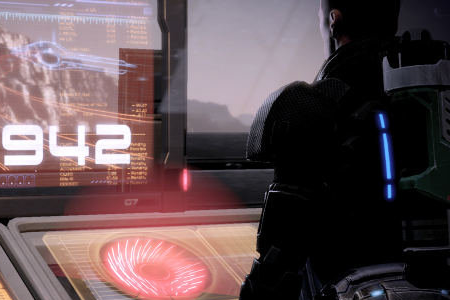
Review at Player Affinity
Red Dead Redemption: Undead Nightmare

Pretty darn meaty for ten bucks, Undead Nightmare completely changes Red Dead from a western-themed shooter to a game all about scraping by against a horde of zombies. Ammo is limited, enemies charge at you in groups and only go down easily from headshots, and there isn't a lot of help to be found. You'll usually divide your time between doing missions to advance the lengthy and surprisingly funny story and rescuing and defending outposts from invasions, which is more fun than it sounds. Most DLC doesn't come close to changing the game as much as this one, and it's a lot of fun. There are a bunch of other supernatural extras like side jobs involving horses of the apocalypse and sasquatches. One of the best DLC packs for the money I've ever played.
Tuesday, February 15, 2011
Tuesday, August 31, 2010
Mass Effect
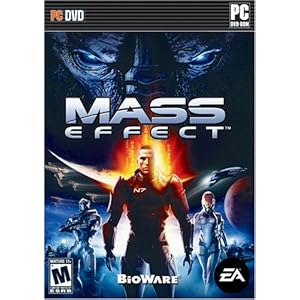
I've mentioned before that Star Wars: Knights of the Old Republic is the game that got me into western RPGs. So I guess it's not a surprise that I quite enjoyed BioWare's return to the science fiction landscape. Mass Effect takes place within its own original universe, although the influences on both the design and the setting from that game and other classic science fiction are obvious. Without being a real expert on the history of the genre, I'd say the two most obvious influences on Mass Effect's world are Star Wars and Star Trek. You have the former's quasi-mystical powers and diverse alien species (Trek has aliens, but they all look like people with weird foreheads), and the latter's more adult focus on politics and how a gathering of races from across a galaxy would form a society and government together. The final result is a bit darker than both at their more adventurous, but the impact is there. There's literally an encyclopedia in the game's pause menu if you ever want to look up details on the history and specifics of pretty much any piece of back story it cares to bring up, and the amount of thought put into everything is one of the game's biggest assets.
You play as Shepard, a customizable protagonist and eventual commander of the most advanced ship in the alliance fleet. The alliance is sort of like a more militaristic Starfleet, except it only represents human interests in the galaxy. There's no real shared military, although the alliance have a working relationship with the council, a multiracial tribunal that operates out of an ancient space station called the Citadel and has influence over many things. I'm really explaining a lot of background here, aren't I? It's an interesting set up. Anyway at the beginning of the game you are given a mission that will require a ship and an elite team, and you report to both the council and the alliance. It's pretty easy to fill out your party, and from there you generally have a choice of planets with important objectives to complete. There are also dozens of optional worlds you can visit, but I'll get to those later. You fight evil robots, help or ignore troubled people you come across, talk a lot, and try to track down and stop the bad guy.
The game likes to pretend sometimes that it's a primarily a cover-based third person shooter, since those have been popular for a few years and were really blowing up when it came out, but it really isn't. Yes, you can hide behind objects and point a target at enemies and click to fire, but success is less determined by an ability to aim and shoot and more by good management of your allies, use of abilities, and having stats good enough for an invisible random variable to decide that your shots hit more than the other guy's. This didn't bother me as much as other people, I just don't see the point of the charade. Knights of the Old Republic's combat system was plenty of fun, and totally honest. You paused the game to assign actions, and chance and numbers determined whether your light saber swings and blaster shots hurt the enemy. Mass Effect playacting as a shooter just distracts from what could have been a more interesting system. I understand that the sequel actually performs like a true shooter, which is a fine direction to take, as it's at least a more genuine attempt to reach beyond the standard number-crunching RPG player.
So while I lived with the combat, what I really liked was simply learning about the different cities and outposts I was exploring, and developing my relationship with the various people in my crew. RPGs always seem to do better at creating a camaraderie amongst an interesting cast of characters than other games, if only because they actually take time to do so. And I liked my crew a lot. I talked to them after every job to see what they thought, and I did all the side quests that tied directly to their characters, not for the rewards, but because I wanted to help them out. They're a diverse group, and while the dialogue was often a bit straightforward, I still felt some level of connection to them that I just don't usually. I found myself choosing who to take on expeditions based on who it made sense to bring, not who would statistically help me in combat the most, and some of the things that happen to some of them later in the story actually made me feel a bit of emotion. It lent weight to the morality system, which is mildly interesting because it determines more what kind of leader you are rather than whether you're good or evil, but otherwise is still pretty standard.
I guess I should mention the game's biggest weaknesses, the silly mini-game that seems to determine a little too much of what happens, and the Mako, a vehicle which popped up way too much based on how much of a headache it was. Frequently when activating objects in the game, you have to solve a little game where you guide an arrow into the center of a circle while objects rotate around it nearby that you have to avoid. Fail to do so, and you either have to try again or pay a material cost to bypass it. It made some sense when trying to break electronic locks, but the game uses it for much more than that, including recovering objects from wreckage and even surveying rocks for minerals. It's a huge pain in the ass and never really makes sense in context. And man, the Mako. It's an armored jeep type thing that goes over a lot of terrain, but it's a gigantic annoyance whenever you have to use it, which is often on required story missions, and always when exploring optional planets for useful objects. It controls like crap, it's not as useful as it feels like it should be in combat, and none of the places you use it in are designed well enough to get past this. It's just a struggle every time you're behind the wheel. It would have been a bigger issue if it was at its worst when it's actually necessary, but thankfully that's not the case.
Beyond those small issues, I had a lot of fun in the twenty hours the game took me. The story was pretty good, conveyed by some decent writing and well acted by the cast, including a smattering of recognizable celebrity voices that fit their parts appropriately. The game's presentation helps immensely, although I was unable to get the full effect of the motion capture thanks to the constantly poor frame rate on my machine. I'll admit it's an old system, but it probably shouldn't have run a three year old game this choppily. BioWare's games have always had odd technical issues on the PC, and I have to imagine it's partly the game's fault as well as my computer's, because I began Dead Space recently, which came out a year later, and it can at least do static conversations smoothly. It was rare for the issues to actually impact gameplay negatively, but it was an unfortunate distraction a lot of the time. It sounded pretty good though, with the previously mentioned voice acting and strong score helping to sell the universe. Whatever problems I had, I wanted to play the sequel as soon as I finished, which is not something I've been able to say much recently. I guess the question is whether I'll play it on PC, or if the way they handle the PS3 version makes it seem worth the switch.
